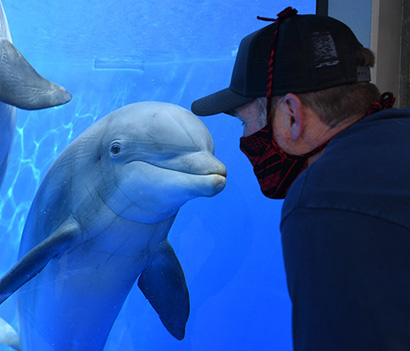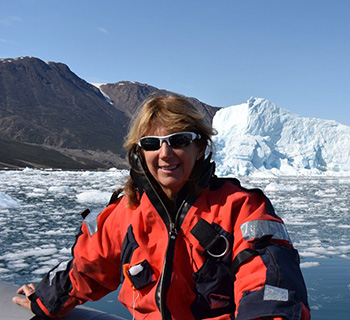Campus News
Seymour Marine Discovery Center offers new marine science virtual expeditions
“Scientists Saving the Oceans” program begins with a behind-the-scenes look at how marine mammal researchers are working to protect dolphins and whales from ocean noise.


The Seymour Marine Discovery Center at UCSC’s Long Marine Laboratory is launching a new “virtual expeditions” program for marine science enthusiasts. The program, called “Scientists Saving the Oceans,” is part of the Seymour Center’s efforts to provide distance learning activities for the public during the COVID-19 pandemic.
The first expedition, “Protecting Dolphins and Whales from Oceanic Noise,” will take participants behind the scenes with researchers in the Marine Mammal Physiology Project headed by Terrie Williams, professor of ecology and evolutionary biology at UC Santa Cruz and director of research initiatives at the Seymour Center.
Facilitated live through Zoom, the expedition consists of six engaging 90-minute classes. Each class session includes live-streaming time with staff and resident animals at Long Marine Laboratory. The classes begin February 8 and are limited to 20 participants. Registration form and additional details are available online.
Participants in the virtual expedition will get to interact with Long Marine Lab’s expert animal trainers and researchers to learn how they care for dolphins and seals and train them to voluntarily participate in conservation science; observe researchers in action and learn how new technologies are developed to investigate animals in the wild; and understand how studies done at the lab underpin field research aimed at protecting narwhals and other marine mammal populations around the world.
“We want to show people how we work with the resident animals, what we learn from them, and how we are able to apply that information to understand the impacts that human disturbances are having on animals in the wild,” Williams said.
Since her appointment in September as the inaugural director of research initiatives for the Seymour Center, Williams has been working to create and develop public programs at the Seymour Center that highlight the work of researchers at UCSC’s Institute of Marine Sciences. She said faculty are excited about explaining their work to the public, and being forced online by the pandemic has created new opportunities.
“A lot of us who do field research have photos, videos, and other documentation of what we are seeing in the environment year after year, and it’s an amazing resource. We are the frontline workers for the environment and are witnessing what is happening to this planet. Our scientists have stories to tell about marine life and the marine environment—these are passionate people who are trying to save the oceans, and we want to bring their stories and their science to the public,” Williams said.
To develop the Scientists Saving the Oceans program, Williams worked closely with Beau Richter, head trainer for the Marine Mammal Physiology Project, and Kevin Keedy, youth programs manager at the Seymour Center. Keedy and Richter helped transform the center’s popular Ocean Explorers summer camp into an online virtual program last summer, and Seymour Center staff have been creating a variety of distance learning programs to support teachers and families with virtual visits to the Seymour Center.
The center is offering a variety of other programs in virtual formats while its physical site remains closed to the public due to the pandemic. These include the Science Sundays lecture series; ocean-themed celebrations such as the upcoming Elephant Seal Week (Feb. 21-27), featuring at-home activities, lectures, and interviews with scientists; the Labside Chats series of online conversations with scientists; and the members-only Aquaria Explorations.
The Seymour Marine Discovery Center is a community-supported marine science education center at the UC Santa Cruz Coastal Science Campus. The Seymour Center is dedicated to educating people about the role scientific research plays in the understanding and conservation of the world’s oceans.